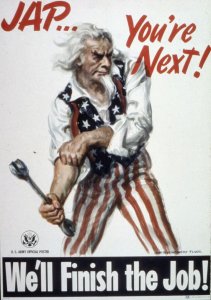I watch the Tokyo news every night, and of course they covered the bomb anniversary. I grew up during the war and I remember the event quite well. The vast majority of Americans, at that time, not to mention people around the world, greeted the dropping of the bombs and Japan's surrender with an outpouring of joy and relief exceeding anything else I have ever witnessed since. No one at the time thought it was a wrong thing to do. Of course it was a great human tragedy. No doubt about that, but I confess I was really angered today to hear one Japanese man, who might have been a survivor, describe it as "an inhuman act". Well I'm sorry, but the Japanese military with deliberate forethought and intent to extend their empire, started the war. Anyone interested will find it easy to learn of the deliberate bombing of civilians, rape, torture, and four years of inhuman acts committed by the Japanese during WWII.
As far as Japan being ready to surrender; not only Japanese soldiers, but civilians as well, can be seen in documentaries committing suicide rather than surrender. There are films showing civilians drilling in the streets of Japan with sharpened sticks in preparation to defend their home land. I really am not an expert on the following. Just typing from recall. I remember seeing a documentary about Japan's surrender. As I recall, it took some kind of coup by some under officers, to force the decision on the Emperor. No. I'm sorry. I'm a died in the wool pacifist, and I love today's Japanese, but they are not who we were dealing with in WWII. It was a horrible event in human history. No doubt about that. Thousands of innocents killed. It must never happen again. No doubt about that, but let's be careful about who's pointing fingers at whom.


